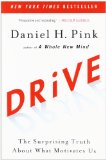Book Review: Drive (Daniel Pink)
Tags:

Recently finished a thought-provoking book that I think deserves at least a quick mention. In Drive: The Surprising Truth About What Motivates Us, author Daniel Pink (@DanielPink) makes the case that modern intellectual endeavors respond poorly to "if / then" or "carrot and stick" methods of reward and punishment. He uses a decent body of relevant research to illustrate how "if / then" motivators promote focus, which can improve results of simple tasks that require little thought. This same focus, however, narrows our vision, impedes creativity, and dulls the personal satisfaction that we naturally derive from lateral thinking and creative problem solving. This idea struck a cord with me, especially when he highlights the success of technological open-source endeavors such as Wikipedia, Firefox, Apache, and Linux.</p>
Additionally, he makes a case (for which I've seen evidence) that beyond a certain threshold, money is an especially poor motivator over the long term. While people need to "make a living," that ones the essential bases are covered, people don't frequently respond as anticipated to additional money (decreasing marginal response). This falls in line with some research on "happiness" that indicates that the relationship between money and happiness runs out at around $75k / yr (sorry no source — Google is your friend), and increasing income above that threshold is not associated with greater happiness. He stress that somewhat abstract ideas such as autonomy and purpose are much greater motivators in these cases and suggests that the employers that wish to produce superior results from their employees would be well served to address these needs as well.
Pink frequently refers to some "simple tasks" that do respond to financial incentives, at least in the short term, simple tasks being essentially any job that can be done "by following a set of instructions." He also cautions, however, that employees involved in such labor should be wary, as such simple jobs will almost definitely be replaced by off-shore labor or automated with technology in the near future.
My favorite part of the book is Pink's demonstration that humans are not rational beings and don't respond as anticipated by classical economics. As opposed to the idea that "in a world of perfect information and low transaction costs, the parties will bargain to a wealth-maximizing result," he gives the reader a thought experiment. Imagine that an individual was awarded $10, with the stipulation that they must share a portion of that $10 with you, and that you must accept the proposed deal. If you refused the deal, neither of you get anything. If they offered to keep $4, giving you $6, you would almost certainly accept the deal. An even split, $5 and $5, would probably also be accepted. However, if they offered you only $2, with them keeping the $8... many people might reject the offer out of pure spite (IIRC, he vindicates this suggestion with statistics from an international study based on a very similar setup). Rationally, you would be $2 richer for no effort at all. However, people have other, irrational drives that frequently push us to make counterintuitive (or at least illogical) decisions that override financial incentives.
Drive did an excellent job of getting me to think more critically about my personal motivators, and the motivators that can be employed in medical school to help future physicians extract more pleasure and satisfaction from their studies. I suspect that the transition to a pass-fail curriculum (UNM is rumored to be seriously investigating a trial) may help promote this "intrinsically motivated" learning. I would also venture a guess that this is the intended outcome of our "PBL" sessions (although not terribly successful in this regard, I must admit). Unfortunately, PBL seems to attempt to "walk the line" between autonomy and extrinsically directed learning, which results in a "You're free to choose your own learning issue, as long as you choose this one" situation. I think a pass-fail system would help students redistribute their time, allowing them to focus their studies on the areas most important to them. It seems that many students have areas of particular interest that they will gladly spend their free time researching and studying until they know them thoroughly (If not, perhaps they should have chosen a different vocation.)
It's indisputable that medical students need to demonstrate a minimum level of competence in a wide variety of sciences. However, it's at least possible that I would have been better off in terms of satisfaction, accomplishment, and time efficiency, if I had traded some of my time studying uninteresting topics for others about which I'm more passionate. I think a "pass-fail" curriculum would have facilitated the decision to do so. The unfortunate and glaring rebuttal is that many students may not redistribute their time to emphasize "valuable" activities. If students simply spend less time studying and more time playing Halo, the outcome will be poor.
Well, I think that's all for now, time for a nap. I have much to learn about pacing myself when writing. Instead of an enticing introduction, stimulating exposition, climax, and sophisticated resolution, I frequently awake to find myself in the middle of nowhere with either nothing left to say, no energy to say it, or both. Oh well.